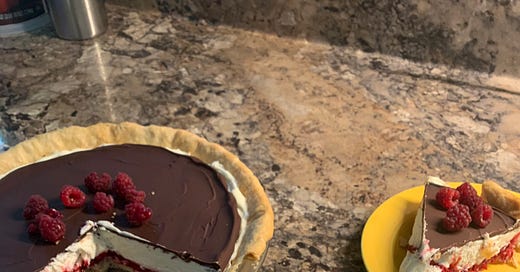Welcome or welcome back!
(I hope you got to watch my video this week. It made me feel a little more connected.)
I’m bringing a potluck of resources today. Feel free to offer your comments. too.
+++
People experiencing loss wouldn’t mind a meal.
When I was growing up, we had potlucks at church from time to time. Depending on the first letters of your last name, your family brought salad, main, or dessert. “Salad”, of course, was loosely defined, from healthy to dessert with a new name (think Jello with whipped topping folded in). “Main” could be a casserole or could be Kentucky Fried Chicken. “Dessert” could be home-made or a store-bought frozen chocolate cream pie.
The point, of course, wasn’t the food. It was that each family brought what they could and together you had community.
Potlucks have been part of grief support for a long time. From funeral dinners to meals to stick in the freezer for later to a favorite meal delivered to the front step in the first shocking days of loss.
When people talked to me about what they found helpful after a loss, food was a practical support several people identified.
It may be a way you can help, too. If you do, think about these things:
Use disposable containers.
Ask about allergies.
Give clear preparation instructions IN WRITING
Think about the person likes, not what you like.
Coordinate with others.
If you have more ideas, leave a comment.
(A few years back, I spoke to a college chapel service about Potluck and Pie – Social Media Chaplain. Not long after that presentation, most funeral gatherings stopped for a few years. I still like my idea of learning to make the perfect mac and cheese (vegan or not) as the thing you do to be helpful.).
+++
10 books to help you help people in illness and loss. – Being Helpful in Loss
The other day, someone on Twitter wrote to tell me that he shares “This is Hard” with people and asked, “What other books for chaplains do you recommend?”
I told him that would take more than 140 characters and then wrote a whole post.
I made my own rules for the list:
What books are either shareable by chaplains or readable for chaplains?
I’ll assume that people have their own lists of books that are particularly helpful or readable and this can be mine.
I’ll assume that books on chaplaincy itself are found elsewhere.
And because I’m allergic to platitudes, these books talk about faith in the middle of hard times, not as an antidote to the pain.
Read the list: 10 books to help you help people in illness and loss. – Being Helpful in Loss
+++
Yes, It’s Different, but Fathers Suffer in Miscarriages, too (madetoflourish.org)
I read this post from Eric Schumacher this week. It was a reminder that more than one person can feel loss of the same person, and those feelings and responses can be different.
Schumacher wrote,
“Even at church and among friends, when the miscarriage was discussed with me, it was usually regarding how my wife was doing. Few, if any, checked on my heart. The responses I’ve received since writing publicly about miscarriage confirm that this experience is not limited to me alone.”
One study that Schumacher cited identified four themes in men’s responses: secondary status in comparison to the female partner (“She’s the one who was carrying the baby”), uncertain transition to parenthood (“I was just getting used to the idea of being a dad”), gender roles and coping responses (“Be a man”), and ambiguous entitlement to health care (“Do healthcare providers see me in the room?”)
+++
Finding words will be hard sometimes. That’s not a problem. It’s a feature.
I wrote the rest of this newsletter and then realized I needed to have a conclusion. Something to tie things together, to make the point, to call us to action. Or something.
I finally quit trying and built a birdhouse.
Literally. Out in the garage.
It will give bluebirds a home this summer, but it didn’t give me my conclusion.
Not exactly.
But as I finished it and came in, leaving cleanup for morning, I realized a couple things.
It will not appear on episodes of any reality show, from This Old House to Maine Cabin Masters.
It will serve the birds.
When we talked to our friends in really hard times, we need to step back and remember that we are not trying to be expert speakers, precise therapists, profound philosophers. We’re trying to help the people we love. We struggle to find the words and the silences because this is hard. We’re literally talking about life and death.
Our struggles mean we’re taking our friends and their needs seriously. Being inarticulate and resorting to a hug may be the most articulate thing we’ll ever not say.
+++
Thanks for following along.
See you next week.
Jon






If you take food, put a date on it. Sometimes different people are at the house, and knowing which leftovers are oldest helps a lot.
Think about the number of people in the family. Right after a loss, extended family may be coming in from various places. So it may help to prepare a larger dish.